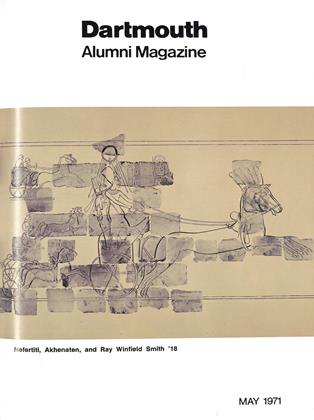Francis V. "Bud" Brown's receipt of a Golden Key Award as the teacher who most influenced the life of Sesame Street creator, Joan Ganz Cooney, was noted last month with a Wah Hoo Wah and a featured place in the '25 class notes. Bud's "career" however, has been like a patchwork quilt, vocations and avocations worked together into a life style that was just what he wanted. "Don't know anybody on earth I'd change places with or envy," he said some time ago.
For 22 years he taught history and civics to Arizona high school students, Mrs. Cooney among them. She remembered him as the person who taught her "not what to think but how to think ... he taught me to question assumptions, and I've been questioning them ever since. He always tried to get students to look at things in a new way."
Bud's technique of classroom participation and student discussion is standard today, but in his time in Arizona it was controversial. "I kept emphasizing to my classes that the one unchangeable thing in life is change," he says, "and this, of course, is anathema to a great many people. As my old daddy used to say, 'As it was in the beginning, is now, and by gosh it's got to stop.' "
An easterner by birth, Bud seems to have been a man of the west all his life; it just went unrealized for a few years. He grew up in Middletown, Conn., and Yonkers. N. Y., and was expected to follow his father, an Episcopal clergyman, as were forebears on both sides of the family, into the ministry. He resisted family pressure and upon graduation from Dartmouth, headed for the west and a job on an Arizona ranch, arriving in time to help in the last of the old time roundups and cattle drives.
Bud married an Arizona girl, Isabel Fuller, and used his ranch-hand savings to buy her father's horse and cattle ranch. In one year a drought and dropping cattle prices wiped him out and, after taking some courses at Arizona State, he turned to teaching.
From the earliest days of his transplantation, he loved and sought out songs, stories and memorabilia of early Arizona. He and Brownie, also a collector at heart, eventually accumulated what was believed to be the nation's largest privately owned collection of early Western Americana.
The collection and Bud's "entertainment side" led them in 1943 to open "Bud Brown's Barn," which catered to large group parties. On one memorable night they served 1,878 meals for a National Cotton Council meeting The Barn offered complete Western evenings, with chuckwagon dinners and Bud himself as M.C., square-dance caller, and teller of wooly Western tales. In the midst of it all, a knowing eye would occasionally recognize the Dartmouth banner holding its own among the antiques and museum pieces that filled the place.
Their summer camp for children near Prescott, Arizona, Friendly Pines, has involved over the years the whole Brown family, three natural daughters, Frances, Beatrice and Margaret, and an adopted son and daughter, Tim and Mary Theodora. Bud retired from teaching in 1950 and sold the Barn in 1958. It had become too successful to remain a part-time activity, so "we just put on our hats and walked out," taking only a clock, a family heirloom. He and Brownie still operate the camp, now in its 31st year. In the spring and fall they lead bear and mountain-lion hunts and pack trips throughout Arizona, and train tours into Mexico. Bud calls this "semiretirement."
 View Full Issue
View Full Issue
More From This Issue
-
 Feature
FeatureNefertiti, Akhenaten, and Ray Winfield Smith '18
May 1971 By John R. Scotford Jr. '38 -
 Feature
FeatureThe Dartmouth Institute
May 1971 -
 Feature
FeatureTrustees Vote to Consider Associated School for Women
May 1971 -
 Article
ArticleThe Undergraduate Chair
May 1971 By JOEL ZYLBERBERG '72 -
 Article
ArticleFaculty
May 1971 By WILLIAM R. MEYER -
 Article
ArticleHanover's Famous May "Murder"
May 1971
Article
-
 Article
ArticleALPHA THETA CHAPTER OF THETA CHI INSTALLED
April 1921 -
 Article
ArticleFRESHMAN CLASS CONTAINS FORTY-FIVE SONS OF ALUMNI
NOVEMBER 1927 -
 Article
ArticleMasthead
February 1945 -
 Article
ArticleHow Carnival is Run
MARCH 1930 By Craig Thorn -
 Article
ArticleThe War and After
May 1943 By P. S. M. -
 Article
ArticleThayer School
November 1952 By WILLIAM P. KIMBALL '29

